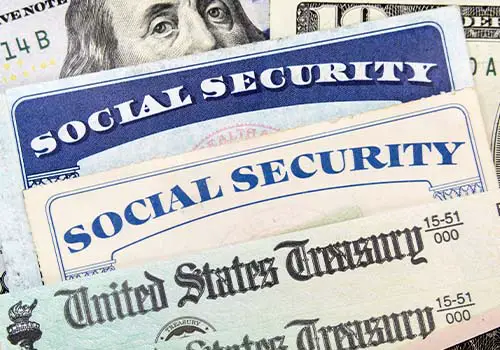The Social Security Administration (SSA) pays benefits to millions of Americans each month. Many believe you automatically qualify for Social Security benefits when you retire, but that is not always true. Some requirements must be met before you will qualify for retirement benefits.
So, how can you be sure you will qualify for Social Security when you reach retirement age? Keep reading as we give you all the details. We will tell you what you need to do to become eligible for Social Security and how to apply for it when it’s time.
How To Qualify For Social Security Retirement Benefits
You have spent many years working and are now getting ready for retirement. Will you be eligible to receive Social Security benefits upon your retirement? There are three main things that you need to do to get Social Security retirement benefits. Here are the steps you need to take.
Earn Enough Work Credits
First, you must earn enough work credits to get Social Security eligibility. You earn work credits during your working years while paying Social Security taxes. You need at least 40 work credits to qualify for Social Security benefits. Remember how Social Security works — you pay taxes into the system while working and then receive benefits from the system upon your retirement.
You can earn up to four credits each year, so you will generally need at least ten years of work to be eligible for benefits. You must earn $1,730 in covered earnings in 2024 to earn one credit. This means that you must pay Social Security taxes on those earnings. You should know that the amount it takes to earn one credit generally increases each year. So, in 2024, it would require $6,920 in earnings to get all four credits.
You might earn this much in a month or two, giving you all four credits for the year. If you are self-employed, you must pay your Social Security taxes properly. Failure to pay your taxes will mean you are not earning work credits and will not be eligible for Social Security benefits when the time comes.
Forty work credits is the minimum required to be eligible for benefits, but earning more credits than this will not increase your benefit amount. Your monthly payments are based on your earnings record and retirement age, not the number of credits you earned.
Reach Retirement Age
In most cases, you cannot start your retirement benefits any sooner than age 62. So, before you are eligible for Social Security benefits, you must meet the minimum retirement age. However, most people do not reach full retirement age until they are 66 or 67. Starting your benefits at age 62 will reduce your monthly benefit amount, while waiting until full retirement age means that you will receive 100% of your benefit amount.
Conversely, your benefit payments will be higher if you can wait even longer. Delaying the start of your benefits past full retirement age allows you to accrue delayed retirement credits. These credits will increase your monthly payment amount, and the credits will max out when you reach age 70.
Apply For Benefits
Even eligible beneficiaries do not have their Social Security benefits started automatically. There is an application process that you must go through to start your benefits. Thankfully, this process is usually quick and easy for retirement benefits.
You can create a My Social Security account online. Using your online account, you can easily apply for benefits. Creating an account only requires your Social Security number and a few other pieces of identifying information. If you do not wish to apply online, you can also talk to a Social Security representative over the phone or at your local Social Security office. Retirement benefits usually begin within three months of completing an application.
KEY TAKEAWAYS
- There are three main requirements for receiving Social Security retirement benefits. They are 1) Earn enough work credits, 2) Reach retirement age, and 3) Apply for benefits.
- You may qualify for SSDI, SSI, Spousal or Survivor benefits, or Medicare, depending on your circumstances.
- It is possible to qualify for multiple Social Security benefit programs such as SSDI and SSI or other assistance programs.
Qualifying For Other Types Of Social Security Benefits
Now that you know how to qualify for retirement benefits, maybe you are wondering about other benefits administered by the Social Security Administration. Some have similar rules for retirement benefits, while others are very different. Here is how to qualify for each of the various types of benefits.
Social Security Disability Insurance Benefits
To qualify for SSDI benefits, you must meet several criteria. Like retirement benefits, you need enough work credits to qualify for Social Security disability benefits. If you are 31 or older, you need at least 20 work credits in the ten years right before your disability started. For younger individuals, you can have fewer work credits and still qualify sometimes.
In addition to work credits on your Social Security record, you must also have an impairment that prevents you from working. This impairment must be a qualifying disability as acknowledged by the Social Security Administration. You will need plenty of evidence to prove your medical condition, and this evidence might include doctor’s notes, lab tests, and other diagnostic tests.
Many people have their initial application for disability denied, and they must appeal the decision to Disability Determination Services or an administrative law judge. It can sometimes take more than a year from the date of your disability application before you are finally approved for benefits.
Supplemental Security Income Benefits
So, who is eligible for SSI? Qualifying for SSI benefits requires a couple of things. One particular rule is that there must be a financial need. SSI benefits are reserved for individuals and families with limited income.
Next, you must be age 65 or older, blind, or have a disability that keeps you from working. There is no work credit requirement to qualify for SSI benefits. You can qualify for SSI benefits even if you have never worked, as long as you meet the income and age or disability requirements.
Spousal Benefits
Those who have never worked might still qualify for spousal benefits if their spouse or ex-spouse has a sufficient work history. You may receive up to 50% of your spouse’s benefit amount. You must be 62, and your spouse must have already applied for benefits.
Divorced spouses can also receive spousal benefits if the marriage lasted at least ten years and the divorce occurred more than two years ago. If the divorce occurred within the last two years, then your ex-spouse must already be receiving benefits before you can apply for spousal benefits.
Survivor Benefits
A spouse and other family members may qualify for survivor benefits upon the death of the primary earner. Even if your spouse dies well before retirement age, you may still be eligible for survivor benefits. You can start survivor benefits as early as 60, although waiting until full retirement will lead to the highest benefit. Full survivor benefits equal 100% of the deceased beneficiary’s benefit amount.
Medicare Benefits
Most people become eligible for Medicare benefits upon reaching age 65. You will be automatically enrolled in Medicare if you have already received Social Security benefits. Most U.S. citizens with a full-time work history will qualify for Medicare Part A at no cost. However, everyone must pay a premium for Medicare Part B coverage. The application process for Medicare is simple and easy, and you can now apply for Medicare online.
Must read articles related to Social Security Benefits
Qualifying For More Than One Type Of Benefit
It is possible to qualify for more than one benefit from the Social Security Administration. Consider a disabled worker who qualifies for SSDI benefits. However, if the benefit amount that they receive is low, they might also be able to qualify for SSI benefits. In that case, they could receive both SSDI and SSI benefits each month. Participation in the SSI program might also qualify the person for other assistance programs, like food stamps and housing assistance.
Sometimes, qualifying for more than one program might reduce your benefit payments. If you receive Social Security spousal benefits but qualify for a government pension, your spousal benefit payments will likely be reduced. In most cases, your benefits will be reduced by two-thirds of your pension payments.
TIP
SSDI eligibility requires a certain amount of work credits, while SSI is income-based and requires your income and resources to be below a certain threshold.
The Bottom Line
To qualify for Social Security, you must earn enough work credits, reach retirement age, and apply for benefits. Remember that your benefit amount is tied to the earnings you have received over your lifetime, not the number of work credits you have.
As long as you have enough work credits to qualify, additional credits do not increase your benefit amount. You can apply for benefits online, at your local Social Security office, or by calling the Social Security Administration toll-free at 1-800-772-1213 (TTY number 1-800-325-0778).
Frequently Asked Questions
Generally, you must work for at least ten years to qualify for Social Security retirement benefits. You need at least 40 work credits to be eligible for those benefits, and you can earn up to four credits each year.
You can qualify for disability benefits with fewer work credits. The younger you are, the fewer credits are required for disability benefits. Finally, you don’t need work credits to qualify for SSI benefits, but you must have limited income and resources.
You can create a My Social Security account and view your social security record there. You should be able to quickly tell whether you have enough work credits to qualify for benefits. If you are unsure, you should go ahead and apply for benefits. Your application will be denied if you do not qualify.
There is no age limit for Social Security. Once you start receiving retirement benefits, you will continue to receive them for the rest of your life. So, when can you collect Social Security?
In most cases, you cannot start your Social Security benefits until you reach the age of 62. However, there is no upper limit to applying for or receiving benefits. Some people wait until they turn 70 to start their benefits so that they can max out their delayed retirement credits.
The easiest way to apply for benefits is online through your My Social Security account. Once you register for an account, you can quickly apply for benefits. You must provide the same information on the paper form, such as your full name, SSN, military service dates, spouse’s name, and other information.
Once the application is complete, you can use your online account to track the status of your application. If you decide not to apply online, you can also apply for benefits over the phone or in person at your local Social Security office.
You can find a Social Security Administration office near you by using our SSA office locator and searching for your closest location.






